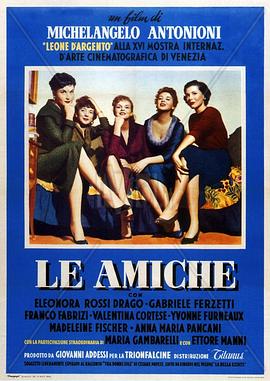详细剧情
长篇影评
1 ) 《女朋友》:她们
影片始于Rosetta的自杀未遂,结束时她终于跳河成功了。她无望地爱着画家Lorenzo(陶艺家Nene的未婚夫),在一个势利浮华的圈子里居然有殉情这等坚贞,确实令人唏嘘——这难道是安东尼奥尼对爱寄托的的希望?但除了微乎其微的怜悯,Rosetta之死毫无意义,仿佛一只泄了气的皮球终于拖拖拉拉地瘪了下去——她活着时已形同虚设,空虚的心灵贪婪着爱,死后也不能引发深切哀悼,朋友们只是如同做了亏心事一般不安:画家回到了未婚妻身边;教唆者Mariella短暂的哀伤之后继续恣意而放纵的生活。
影片纵横捭阖地展现了由众多人物构成的关系网,不过安东尼奥尼将“摄像机”安置在Clelia身上,她是从底层阶级上升而来的女强人(独自一人在都灵开设了时装沙龙),由于目击了Rosetta第一次自杀而介入了她们的圈子,也许是孤独,也许是策略,她需要朋友。她曾热情帮助Rosetta从厌世希望中走出来; Rosetta死后,也只有Clelia歇斯底里了一小会儿,她抱怨自己的大意,谴责朋友们的冷漠,痛惜逝去的珍贵情感。但这又如何?Clelia易感伤却不乏理智,她不会因此而接受位于lower class的建筑师助手Carlo的爱,尽管她和他心心相通。结尾时,她坐上了驶向罗马的列车。
借助Clelia的视角,安东尼奥尼清晰地展现了某种世俗意识形态,是混合着自我陶醉、私人梦想、野心和算计的惊人现实感。人们出于寂寞而彼此取暖,爱早已没了空间,生活中重要的东西忽然转变为模棱两可、面目可疑的种种“成功”。感情被种种狂奔不止的欲望所折磨,沉醉于这些关系网络中的私人事件鸡零狗碎,根本不值得被浓墨重彩地书写,却耗干了全部的念想。最后,连身临其境的人们也不禁厌烦起来,生活突然陌生了,走入熟悉的房间却不辨方向。
虚无,听起来多么可怕的一个词!然而确实就是安东尼奥尼感知的生活真相,对于“虚无”,他从不居高临下,更不试图为其注入意义,当他获悉对“虚无”的任何一种情感反应都纯属多余时——他已完全置身其中了,被虚无笼罩着,在晦暗中凝视。他洞察着空虚的形式并使其贯穿其全部影片,正是这种调子制造了其影片中克制、审慎而又近乎冷酷的距离。而“她们”的故事,有着这种迷人距离的开端。
2 ) 你是哪种女朋友?
从低到高(开玩笑)分:淫荡、非常淫荡、very very 淫荡。哈哈
有的女人如珊娜,很独立。对感情不是不认真,但更多更重要的是对自由的生活方式的追求。
有的女人如模特。为感情所苦。欲生欲死。完全是爱情的傀儡。当一个女人失去自我的时候,往往也得不到爱情。
有的女人如? 视感情为游戏。 活得很滋润也很理智。 感情从来不会构成障碍,但她并不是真的无动于衷。而是强忍的无所谓。这样活得也累。
还有的女人,如画家的未婚妻。对爱执着甚至可以放弃去美国发展的大好前程。但是,束缚她的事她已经付出的感情,当被判他的画家问她:为什么你还爱我时,她说:也许是我对你已经付出了太多吧。 这样的女人拿得起却放不下。不是不优秀,有自己的事业,却还是被男人,准确地说被自己对感情的肯定束缚了。
最后一种,就是那个被打一巴掌就采取报复手段抢对方男人的那个。她活得很自我,今朝有酒今朝醉。很本我,却始终也没有找到自己。
安东尼奥尼很了解女人吗?以生活的阅历而言,或许洞察帮助他认识和警示女性——或许他也并不想教唆什么,只是呈现。隐约中我们还是可以看到他的价值取向的偏向。
女人要独立。不光是经纪上、生活上,更应该是感情上。所谓“生命诚可贵,爱情价更高。若为自由故,二者皆可抛。”
http://idiotmovie.blogcn.com/diary,12394468.shtml
3 ) AFTER FOR WHAT
在电影中,我们不难看出,在二十世纪五十年代左右的那股女权运动之风,以至于我们在几天看1955年的这部电影的时候也丝毫不会觉得有时间久远的陌生感。电影里,Clelia有自己的工作,并且因为自己的努力而离开了从小生活的底层阶级,但她却义无反顾的爱上了处于底层的Carlo。Nene和未婚夫一样是一个艺术家,唯一不同的是她更加出色更加有天分。Momina有自己的房子和情人。Rosetta 为了爱情不要命了。这些时髦的因素即使放在今天也不过时。
她们几个女人面对人生做出了不同的选择。Rosetta选择爱情她最终还是自杀了,这个是典型的逃避。Momina她玩转于情人和丈夫之间,也将永远这样没有一个真正爱情意义上的感情倾泻。Nene这个有才华的女人,面对未婚夫的左右不定和他事业上的压力,她选择做出退让,但最后也是因为未婚夫而放弃了去美国的机会。最后的Clenia,她面对爱情没有半点犹豫,并且面对更好的工作和自己今后的生活她也没有犹豫,理智的作出对她和Carlo最好的选择。
所以说这部电影没有烂俗到女人为了爱情什么都不要了的境地,因为中心人物是Clenia,而她也是一个了不起的,不依靠任何人的女人。这就是成熟。女人似乎永远也逃不出被保护的那个印象,但只要她能够自己站出来,坦然理智的面对一切的时候,她不会比任何男人都要差。这也是Antonioni想要告诉我们的。
然而电影也不仅仅唱颂歌一样,给Clenia戴上自由主义的金冠。Antonioni也在刻画那些处在阴影中的男人。Carlo对自己的地位和处境始终不能对Clenia敞开心怀。当他终于鼓起勇气面对今后他们生活的艰辛时,Clenia却决定离开了。他甚至都不敢在最后让Clenia看到他。还有可怜的Lorenzo面对Nene的成功他是那么的无所适从,那么僵硬的把自己的男性尊严拿出来伤害身边的女人。男人面对女人的崛起,他们只能心绞痛一样将自己蜷缩在角落里,不愿让人看见,这又何尝好受呢?当然,即使几天,男人面对女人的成功也还是这样。
男人女人的矛盾永远不能解决,但至少在最后,驶向罗马的火车里Clenia伤心的面容渐渐消失在Carlo的眼中后,他们还有Antonioni告诉我们,Clenia是好样的,她做出了一个正确的选择。
4 ) 几个难忘片段
第二部分始,裹着白布的尸体,刚刚打捞上来,担架,白色的救护车,又有什么用,河岸边印湿的深色水迹。黑白片,不动声色的冷酷。Mariella曾讥笑Rosetta“can't even kill yourself successfully”,被扇耳光一次;这一次她终于投河自尽,做成了自杀这件事。
Clelia歇斯底里之后躺在床上泪痕未干,立刻就因Carlo的电话雀跃起来,约好见面。此时她或许是想和这位lower class的男人继续发展,然而就在Carlo赶到前,Clelia接受了雇主在罗马的工作offer,决定当晚乘坐火车离开。此处颇感意外。及至相约车站送别,Carlo躲在一侧默默地看着站在车窗旁期盼四顾的Clelia。
就这样不告而别,不再意外。
末尾,Lorenzo将头埋在Nene怀里,问:Why do you still love me?
Nene:Because you make me suffer so much.
最难忘这处对白。
5 ) 伟大的女性令我流泪
在感情的处理上,安东尼奥尼一贯不另类,更不变态。但他的电影经常触及游走在忠诚与叛背的道德边缘的男男女女。他对人的感性冲动与心猿意马有一种特别的敏感,他敏锐地感受到生活的诱惑与感情的易变,但他并不欣赏这种诱惑与易变,相反诱惑与易变令他不安与恐惧。所以我认定安东尼奥尼内心是个清教徒,正因为他珍视忠诚与爱,才会对叛背与感性冲动如此敏感而恐惧。
这部片子提出一个问题,当女性更成功时,男人是否敢、是否乐意与她们恋爱?
从建筑师的助手对女主角的态度来看,女性的成功对男性是一种巨大的压力,男性会变得敏感而被动,不敢或不愿表露真实的感情。如果女性的地位比男性低的话,也许他们的感情会顺利得多。
但是另一方面,女性的心态要健康得多,她们并不因为自己更成功或地位更高而觉得对方配不上她们,女主角主动向建筑师的助手示爱、娜娜一直爱着她不成功的男朋友。她们的爱与世俗的成功似乎没有关系,她们有更伟大的母性。
娜娜的形象令我感动。娜娜作为一个艺术家,比她的男朋友成功。她理解男友的失落,小心翼翼地维护着男友的自尊。她发现她的女友萨娜爱上他的男朋友,为他而自杀,被救过来后与她男友私下来往。她爱着男友,所以她非常失落,但她不吵不闹,只是眉宇之间显出忧愁。她主动找萨娜谈,当知道男友将与她谈一次话时,她预感到男友将向她提出分手。她非常凄惨地对夺去她男朋友的女友说:两个成年人,能让他们在一起的只有爱。只是我是带着爱离开他的。
但是后来娜娜男友发现他真正爱的是娜娜,他告诉了萨娜,导致萨娜投河自尽。当男友重新找到娜娜,并请求她不要离开时,她说:你知道我是不会离开你呢。只有当你不要我时,我才不得不离开。
我已经很久没有因电影而流泪了。但听到娜娜讲出这样的话,我的泪还是忍不住流了下来。女性的爱真伟大!
6 ) [Film Review] Le Amiche (1955) 7.3/10

Antonioni’s fourth feature, LE AMICHE (“The Girlfriends”) corrals five well-to-do young women in Turin, in the center is Clelia (Rossi Drago), who returns from Rome to her hometown to open a fashion salon branch, strikes up friendship with Momina (Furneaux), a divorced socialite, albeit they first meet under the misfortunate occurrence of a suicide attempt fro Momina’s friend Rosetta (Fischer), anyway, the latter survives, and it turns out, she is infatuated with a painter named Lorenzo (Ferzetti), whose companion is their common friend Nene (Cortese), a talented sculptress, also in the fold is the flirtatious Mariella (Pancani).
Rosetta’s defeatist dysphoria does not bid well for her declaration of love to Lorenzo, but it is Nene’s philosophical consideration is more empathetic and precious for a woman doesn’t luxuriate in spite or vengeance for losing her man to her friend, only that judicious impression is smashed to smithereens in the next chapter, when Lorenzo, in the wake of a tragedy he should at least partially answer for, begs for forgiveness, Nene relents and takes this feckless man back, even if it means she has to sacrifice her budding career to allay a man’s bruised ego, a backward-looking woman who prioritizes her man over everything else, surely will do that, and be capable of sweeping his demerits under the rug, but through Cortese’s pathos-driven affection and resignation, Nene comes off more than that, she is a composite of contradictions, that is quite a defining character to pin down, in both men and women alike. Ferzetti’s Lorenzo, on the other hand, is a ball of frustration, anxiety and ill temper, it is not at all palatable to see him get away with his self-involved narcissism.
Momina is completely a different kettle of fish, who does not decline frolics from Cesare (Fabrizi), an acquaintance she befriends through Clelia, yet, if her ex-husband beckons, she is smart enough not to be tied up to one tree only, and her cynical attitude also rubs off on a susceptible Rosetta, Antonioni doesn’t shy away from the discordance among female friends, only, it is always man-oriented, that certainly betrays and is pertinent to the story’s ‘50s temporality, but a bit of foresight might leaven the magic here.
As for a fancy-free Clelia, fetchingly played by a self-possessed Drago reminiscent of Ingrid Bergman’s high-toned elegance, inexorably she falls under the spell of a handsome Carlo (Manni), whose working-class backdrop differs from hers, and tentatively, she tries to sort out her feelings and propose a future with him, but being a career woman who tries not to be defined by marriage, or the man she marries, she thinks better of it when a new occupational perspective opens up, Antonioni might not above to break the class barrier, but highlighting Clelia as the opposite of both Rosetta and Nene in terms of their attitude towards the stronger sex, shows that the progress has taken its pace.
While the interpersonal drama and narrative-heavy structure is not Antonioni’s forte, his keen sense of fashion, natural landscape (a beach side outing shows up the cracks of their little clique) and patient observation and compositional fluidity of his camerawork can all be espied in this neorealism lodestone that luminously throws light on the changing mores of womanhood.
referential entries: Antonioni’s STORY OF A LOVE AFFAIR (1950, 6.0/10), IL GRIDO (1957, 7.2/10); Federico Fellini’s THE WHITE SHEIK (1952, 7.5/10).






















上世纪50年代的时装店太有情调了。喜欢克莱利亚,洛伦佐这种男人很让旁观者鄙视
安东尼奥尼加伍尔夫的既视感,很难想象是1955年的自由之声,现代女性主义宣言,女性群像描摹,有人为了爱情香消玉殒,更多的还是独立坚强的化身,享受自由,掌握自己的人生的形象美不可言,电博画质也比预想中好很多
“如果一个人当众吻你,说明那个人根本不爱你。” 女朋友太多,欺负脸盲。
都灵上流社会五位鲜活靓丽个性迥异的女性。她们隐藏在内心深处的欲望情感以及现实生活中的迷失悲呛。在华丽小布尔乔亚的蓝调氛围中,大师并无过多的昭然自己的标签,只是隐约的暗示了一些暧昧的价值取向。应该说是一部很不错的女性现实主义电影。
后半段有点疲态,最后一个镜头还挺喜欢,镜头没有跟着坐在火车上离去的女主角的脸,而是让观众陪着卡洛一起目送着女主远去,女主的表情、心情便在观众心里留存念想,这比直面女主的模样更有力道。
http://www.tudou.com/programs/view/KHfgb3u8f5Q/
7.6;unapproachable womanity
6/10。像是侯麦拍的安东尼式无聊,通过大量深焦镜头创造出扁平化空间,对话戏隔绝正反打全靠跟随人物的运镜。开篇隐瞒自杀以为是黑色侦探故事,结果迅速跑回暖味不确定状态的老情愫,没了中期探讨社会人际关系萎缩,却已崭露私密心理分析、高度片断化叙述和追求开放式结局,早期5部中比较有趣的尝试。
Film quasi psychanalytique sur les comportements et les états d’âme des figures féminines de l’époque mais du point de vue masculin. La lucidité de sa caméra fait de Antonioni un des grands cinéastes des femmes. Magnifique.
竟然如此婆妈,遮上开头字幕谁能猜到是安东尼奥尼导的哈哈。大概到了开阔的地方形成人和建筑的关系,才能稍微看出一点他的风格来。他的故事里人和人的感情真的很现代,一点都没有几十年前的影子。而且他都是上哪儿找的这么多漂亮又风格各异的姑娘的,有独立,有妖媚,有的脆弱没了爱情不能活...
这是安东尼奥尼的较早期的电影,与他后来的电影,在拍摄方式上还是有明显的区别。后来的安东尼奥尼的电影更加散文化,人物静场很多,但是在初出道的时候,他不敢让人物太静默,所以,《女朋友》里的人物对话滔滔不绝,令人耳不暇听。这部影片也为他赢得威尼斯影展的银狮奖。
四星半. 既可看作《奇遇》的前奏,又是导演早期作品技巧的一次通俗化的全面呈现(换言之,适合拉片分析):在长镜头内部制造动态的构图效果,从同平面的两人到三人的三角形构图,再到多人的前后景,又回到两人的跟镜头,人与空间、物像与景框之间平衡-不平衡-新平衡的流变一气呵成,摄影机如何运动都不至脱出控制,仅在语气断裂时进行剪辑;全片零正反打,且先现了其标志性的手法:对话各方并不望向彼此,而是都朝向画外,以配合空虚疏离的情调. 与陷于无意识的孤独男性相对,女性作为觉解的个体,经由身份的融合获得自我认同(类似的融合在《奇遇》《夜》中再现);安东尼奥尼从五十至七十年代的作品大多有强烈的纪录意味,其对(心理)现实的不懈挖掘表明他是罗西里尼的传人.遗憾的是本片中大量的告解让表意太直白了些.
[4.0/5.0] 女主角 Eleonora Rossi Drago 好像英格麗褒曼。
很一般,大段大段的女性对白。
7.9/10 英字遇上话唠片,群戏撞上脸盲症。这部安东早期男女纠葛片虽然不大有感觉,却也不会厌烦。
精彩!1,改编自科塔萨尔的短篇,同《放大》;2,为现代三部曲的过渡作品;3,与60‘作品风格差别太大,戏剧性、故事性是首位;4,精彩的对话,幽默风趣;5,人物的塑造丰满,仍然探索剧中人物情感;6,意大利人是天生的时尚家,他们的衣着从来都不可能过时
这个电影将女人的那种潺潺微微流变的心理状况挖掘的淋漓尽致
“天赋比男人还高的女人是真正不幸的……”
《奇遇》的群像刻画的预演,她势必重蹈妮娜的覆辙,即使她以最极端的行动证明她从此与这个冰冷丑恶的世界再也无关,而欲望依旧横流,人流依旧前行;有人选择原谅,有人选择离开,有人选择继续沉沦,其实都是看穿了自己,也看穿了世界。
大概可以理解为一部发生于五十年代的《小时代》,这几个女孩子也挺作的,但比小时代更有深远的现实意义。话又说回来,意大利人真是天生的艺术家啊,场景服装美术都是上乘之作,哪怕是家中随便一幅装饰画都很考究,里面的时装放在现在来看也是美轮美奂,可以列入时尚圈的必看清单。